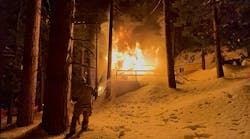April 28--With lax financial controls and scant oversight, volunteer fire companies in Pennsylvania operate in an environment that tempts some who preserve property and save lives to pilfer public money and private donations.
Criminal charges involving embezzlement of volunteer fire company funds are on the rise nationally. Observers say the way Pennsylvania volunteer fire and emergency medical services have historically been structured allows opaque operations that undermine essential institutions protecting small- and medium-sized towns.
Some offenses are small, like the treasurer of the Franklin Hose Company 2 in Edwardsville who pleaded guilty last year to writing $5,000 in checks to himself.
Others can be much higher. The treasurer of the Noxen Volunteer Fire Company was sentenced last month to up to two years in prison after taking $34,000 from company coffers. The former president of the Greenwood Hose Company in Moosic is serving up to two years in prison after admitting to stealing almost $400,000 in fire company funds by writing department checks to himself or his business, an ice cream stand.
Fraud has the potential to destroy entire departments. Two members of the Rice Township Volunteer Fire Department were charged with stealing more than $34,400. The executive secretary took out loans to cover her tracks. The department subsequently defaulted on its mortgage and the township severed ties.
In a case that has dragged on for years and divided a community, the Wilkes-Barre Township fire chief is accused of diverting $48,000 of department funds to himself by not making full deposits, running up a Sam's Club card, and withdrawing money for himself.
In 2009, the treasurer of Dupont Volunteer Hose Co. No. 1, who said he had gambling problems, was accused of pocketing $67,512 from the company's relief association.
These inside jobs -- and the insurance claims that follow -- known as "fidelity claims," are on the rise, said William Jenaway, a educator with VFIS, a York-based specialty insurer serving more than half the nation's volunteer fire companies. The crisis is even worse than the headlines suggest. The missing amounts reported to authorities is usually a fraction of what has been stolen by individual perpetrators over time, Jenaway said. Like any other crime, for every one caught, there are many more getting away with it or yet to be discovered.
Theft and embezzlement from volunteer fire companies has always been a problem, Jenaway said. Decades ago, such matters were handled internally, with the offender dismissed from responsibilities and agreeing to quietly pay restitution. Today, dollar amounts are greater and fire companies report the thefts, which leads to serious criminal penalties and insurance claims.
Nearly all these cases could be avoided, or at least discovered much sooner, by adopting proper basic financial controls within the organization, said Jenaway, whose job is to educate VFIS clients to reduce risks.
Circumstances have emerged to make volunteer fire companies not only vulnerable to theft, but less than enthusiastic about Jenaway's call to action. The clannish nature of volunteer fire companies allows leadership to be concentrated among families, lifelong friends or neighbors, setting the table for misplaced trust or even conspiracy.
To remain relevant and effective, volunteer fire companies focus on training opportunities and recruitment, rather than financial management and controls. That often leaves the books neglected. In Pennsylvania, volunteer fire companies handle millions of dollars in public funds and donations, but are legally treated as private membership groups with little oversight.
Public or private?
Saving life and property is as essential as community service gets. For that reason, volunteer fire companies often receive both state and local taxpayer dollars and raise private donations from the residents and businesses in the communities they serve. Even the smallest companies with one truck and a small fire hall can easily have assets exceeding $1 million. In rural areas, fire halls become community centers and meeting places.
As private memberships, volunteer fire companies can close their meetings to the general public. Across the state, volunteer departments are fighting in local courts and working with legislative allies to keep their finances from public view. They hope to amend the state's Right to Know Law to exclude them.
The state Office of Open Records has consistently declared that volunteer fire companies are subject to the Right to Know Law. Going into effect Jan. 1, 2009, the law expanded the definition of "agency" to include any organization, public or private, providing an essential governmental function. As a result, fire companies' records are presumed public.
Volunteer fire companies are defined as public agencies under other laws, such as the Pennsylvania Governmental Immunity Statute, which limits liability and damages from lawsuits.
Challenged by firefighters, some Open Records office decisions were reversed on appeal to local courts in York and Tioga counties, leaving a situation where volunteer fire companies' records are presumed public in all counties but two.
Public access to volunteer fire and EMS documents is spotty and unresolved, said Melissa Melewski, a media law expert with the Pennsylvania News Media Association.
State Auditor General Eugene DePasquale said he would not oppose making volunteer fire companies subject to state audits. "This is an appropriate policy question. There should be openness and transparency at every level," he said. "While we don't show up to be anyone's buddy, we believe we can be an asset to volunteer fire companies and help them to manage and improve their organization."
Despite the public money raised from taxes and fees that help volunteer fire companies, DePasquale's office has no access to the companies' books unless they invite his office, which they often do after they discover a theft.
The state funds are funneled through Volunteer Firefighter Relief Associations, or VFRAs, separate legal entities from the volunteer fire companies whose leadership is often the same. VFRAs maintain funds to support volunteer firefighters who are injured in the line of duty.
The associations also receive public money that directly supports firefighter training and the purchase of safety and firefighting equipment.
The VFRAs, which statewide receive more than $100 million annually, are subject to state audits. However, they have the effect of buffering the underlying fire company from state scrutiny. VFRAs need only show the state that funds are being distributed to the departments, but many don't keep reliable records.
"Many relief associations fail to maintain records which sufficiently detail the financial transactions of the relief association," DePasquale wrote in a 2011 report. "These records are deficient."
The report notes that many associations' bylaws are not up-to-date and don't reflect recent legal mandates. His comments echoed those of his predecessor, Jack Wagner.
In a recent interview, DePasquale said there is nothing unique about the shortcomings of VFRAs, noting that his office finds similar deficiencies in school districts and municipal pension funds.
Curt Varone, a Rhode Island attorney who has worked as a paid and volunteer firefighter, said placing volunteer fire companies under state scrutiny would harm fire protection.
"You would drive folks away from the department," he said. "We are dealing with people who already build their lives around the fire company. To have the state come in, telling them to sit up straight and fly right, would make even the most altruistic person say 'forget it.'"
It took new legislation to crack the door into the finances of volunteer fire departments. A 2008 law gave municipalities the right to request an accounting of how their contributions to volunteer fire departments are spent. If a township gives a department $10,000, for example, the financial report need only show that $10,000 was spent as intended. It is not a full review of department finances.
Other states have more transparent means of providing fire and EMS protection, creating fire protection districts or fire protection authorities that operate like governmental entities while working with volunteer organizations.
Neglected finances
Financial management is not a priority for volunteer fire departments or the organizations that represent them. A would-be volunteer used to be required to take a 40-hour class and be ready to protect life and property as a firefighter, said Paul Lukus, Forest City Area Fire and EMS and a PA Director for the National Volunteer Firefighters Council.
With more complicated firefighting and safety equipment and other issues, training hours are well over 100 hours. Third-party testing is rigorous. Rural departments often aren't near training venues. Meanwhile, departments confront a push to have all volunteers -- eventually -- earn the same level of certification as professional firefighters. When considering the ever-rising expectations, "volunteer" becomes a misnomer, Lukus said, making it increasingly difficult to recruit new members.
People become firefighters to put out fires and rescue people -- not account for money, said Robert Timko, of Fairview Township, who has worked both as a professional and volunteer firefighter who has seen the financial talent gap at departments. "President and treasurer are the two jobs no one wants," Timko said. "No one joins a fire department to be an administrative leader -- yet that's exactly what volunteer departments need."
'Not an issue'
The reaction of volunteer fire groups to reports of theft and fraud range from minimization to defensiveness.
The National Volunteer Fire Council, the primary national group representing and supporting volunteer departments, doesn't view fraud as a major problem.
The council offers valuable training, recently on issues such as how to respond to gunfire at an emergency scene and how to help the mentally ill. A recent review of dozens of online training modules showed a single webinar on financial management, one presented by VFIS and Jenaway. The training was tucked in the category of "Reputation Management," part of the same category of training that includes use of Facebook as a public relations tool.
Despite the dire tone of Jenaway's webinar, available on YouTube, Kimberly Quiros, director of communications for the National Volunteer Fire Council, said incidents of fraud among that nation's 30,000 volunteer fire companies are few and that the vast majority handle their finances responsibly.
"When it does happen, it shakes the reputation of the whole fire service," she said, adding that in some cases, missing money is an "honest mistake."
Tom Cullen, former president of the Firemen's Association of the State of Pennsylvania, said other than permitting the auditor general's office to offer financial record-keeping information to members, his group doesn't offer any resources on financial management or fraud prevention.
"This is a problem for all nonprofits across the board -- not just volunteer fire departments," he said. "Officers take advantage of their positions in all sorts of organizations -- church groups, Little Leagues."
That view echoes that of many departments. Even a department that is a victim of theft or embezzlement, can view it as a single bad actor and isolated incident without looking at the steps that could have prevented a dedicated firefighter from becoming a thief.
Consolidated power
In many departments, a single person, or two members of the same family, have control over finances. Such leadership structures can last for generations, said Lukus, who has seen volunteer fire companies handed down "like a family business."
Firefighters trust each other with their lives and they extend that trust to department operations and finances, preventing them from putting financial controls in place.
"These people are fighting fires alongside each other, risking life and limb together and protecting one another," Jenaway said. "Just because you know someone, you don't necessarily know who they are."
The people with their hand in the till are not inveterate thieves, Jenaway said, but rather people who find themselves in financial crisis, with access to money. The combination of means, motive and opportunity yields criminal activity.
"They may have to pay off the debt, enjoy going to the casino, or have some other urgent financial need," he said. "They may initially start taking money with the intention of putting it back. But then it spirals from there."
Varone, an attorney who has represented fire departments and firefighters accused of theft, sees another dynamic -- officers who spend so much time on department work that they rationalize the first theft.
"They are doing more work than anyone and they say, 'I'm entitled,'" he said. "When the first theft turns out to be easy, because the department doesn't have people overseeing the overseer, well, then the theft becomes hard to stop."
Copyright 2014 - The Citizens' Voice, Wilkes-Barre, Pa.





